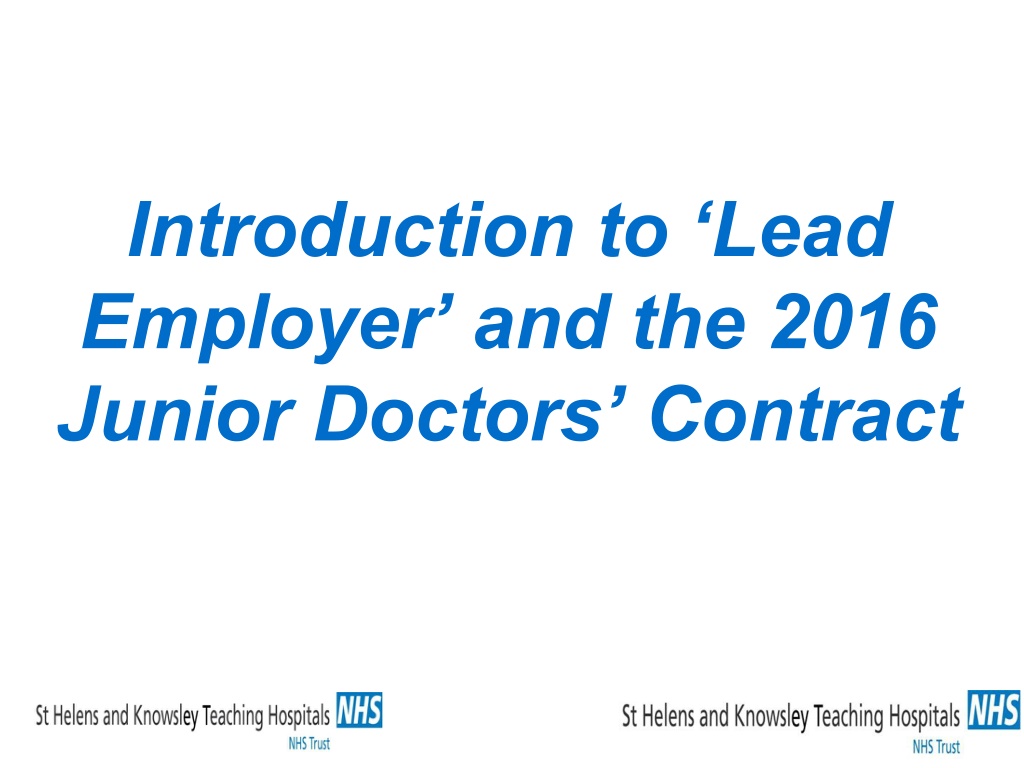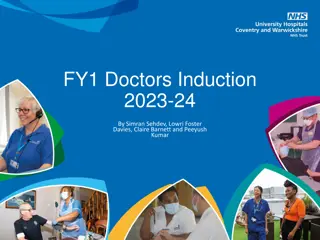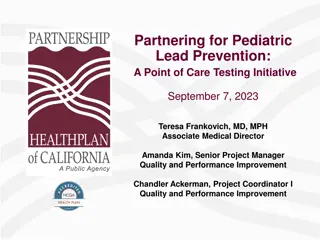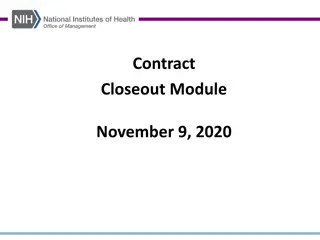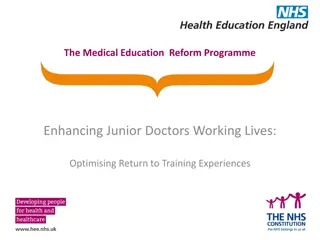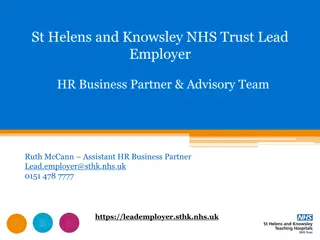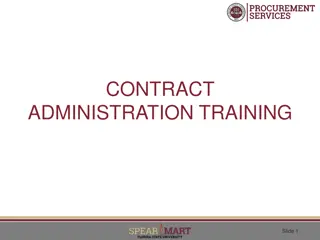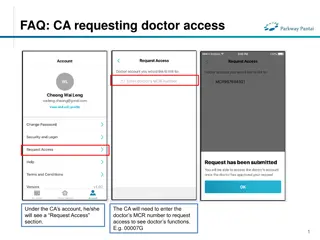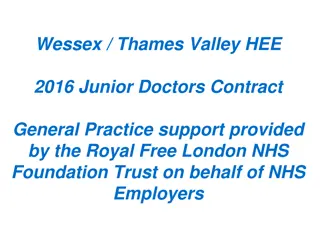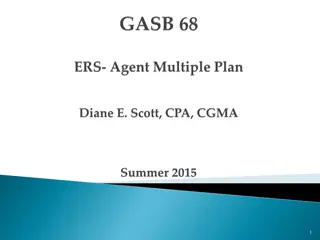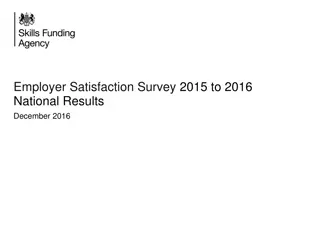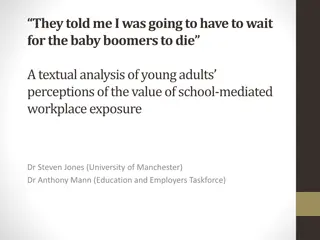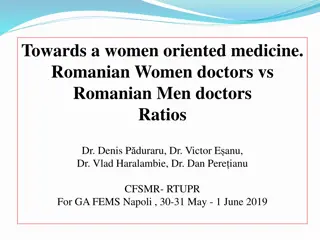Introduction to Lead Employer and the 2016 Junior Doctors Contract
Acute DGH Trust is a leading employer for Junior Doctors in the UK, responsible for over 4,700 trainees across multiple regions. They are currently implementing the new Junior Doctor 2016 contract with a focus on supporting trainees through their employment lifecycle. The transition to Lead Employer will occur for different groups at specific dates to ensure a smooth process. Their vision is to be a model Lead Employer of best practice by continuously developing services to support the healthcare workforce effectively.
Download Presentation

Please find below an Image/Link to download the presentation.
The content on the website is provided AS IS for your information and personal use only. It may not be sold, licensed, or shared on other websites without obtaining consent from the author. Download presentation by click this link. If you encounter any issues during the download, it is possible that the publisher has removed the file from their server.
E N D
Presentation Transcript
Introduction to Lead Employer and the 2016 Junior Doctors Contract
Wed Like to Introduce Ourselves Acute DGH Trust employing c.5,000 staff Payroll provider for c.30,000 NHS staff covering a variety of different terms & conditions Currently Lead Employer for three HEE regions for c.4,700 Trainees (of which c.2600 are GP) from Southend to Southport soon to be four regions with c. 5,500 trainees Very well versed in engaging a large number of Trainees whether as new starters or TUPE transfers in a short space of time from multiple employers. Currently implementing the new Junior Doctor 2016 contract, including the appointment of a Guardian of Safe working who is responsible specifically for GP s Working with NHS Employers nationally to ensure the new Junior Doctor Contract is fit for purpose for Trainees employed via a LE Engage with over c.1250 Host Organisations including NHS Trusts, GP Practices and Hospices
Wed Like to Introduce Ourselves Our vision is to be the model Lead Employer of best practice through ensuring that we continuously develop our services Our mission is to assist HEE with their objective to support the delivery of excellent healthcare and health improvement to the patients and public of England by ensuring that the workforce of today and tomorrow has the right numbers, skills, values and behaviours, at the right time and in the right place Our model has been developed to provide you with the assurance to feel confident that all Trainees will be supported through their employment life cycle. This gives them every opportunity to safely, and successfully make the journey from a Doctor in Training to General Practitioner. We have implemented a nationally recognised LE model through the streamlining of systems/processes/policies/procedures and developing new ways of working. We have achieved this by the innovative use of IT systems and on-going effective stakeholder engagement.
Who will transition to the Lead Employer, and when? We will become the Lead Employer within the East Midlands for all new starters to GP Training from 2nd August 2017 Current GP ST1/ST2 Trainees will TUPE transfer to Lead Employer on the 1st July 2017 on their current given contracts, and they will then be issued with a 2016 Contract by us from the expiration of their current contract end Current ST3 s whose contracts expire on the 1st August 2017 will remain employed with their current employer until termination on this date. Out of sync ST3 s that hold a current contract up to the 31st October 2017 or earlier, will remain employed by their current employer for this period until termination. Out of sync ST3 s that hold a current contract beyond the 1st November 2017 (e.g. LTFT Trainees), will though TUPE transfer their employment to us on the 1st July 2017 on their current given contracts for this period. N.B. There may be anomalies for ST3 s (further detail in the Implementation Plan)
Next Steps in the transition to Lead Employer: Further weekly/fortnightly communications will be issued including FAQ s which will clarify a detailed list of our collective roles and responsibilities to ensure a smooth transition Including communications around setting up new systems e.g. Electronic Staff Record (ESR), E-Expenses and Exception Reporting tools We will follow legal due process re TUPE (where required) which will include formal consultation with BMA colleagues We will also require your help when collecting Due Diligence information on the current trainees within your practices to ensure a smooth transition As part of our introduction we will also be attending all of the key forums such as GP Manager and Trainer Events, HR Directors, Medical HR Specialists, HEE EM, the BMA and other key stakeholders
2016 Junior Doctors Contract
Junior Doctors Contract 2016 This contract was agreed between NHS Employers and the BMA - albeit BMA members subsequently narrowly voted against it Neither us as Lead Employer, you as trainers or HEE were the authors of the contract but it is incumbent on us to implement it Change is nearly always difficult and concerning especially when it is as radical as this but we need to make it work nevertheless We as Lead Employer will do our best to help and navigate you through this process HEE is there to guide you through the training aspects of the change
The big picture who does what? This is fundamental. Triangular relationship between Host organisations, Lead Employer and HEE. Lead Employer Host HEE Junior Doctors 2016 Contract Nowhere is it more important and imperative that we work together than with implementing the 2016 Contract
Junior Doctors Contract 2016 IMPLEMENTATION Junior Doctors on run through contracts issued pre August 2016 remain on their 2002 contracts of employment, unless they need a new contract However GP Trainees in the East Midlands were not on run through contracts Current ST3 GP Trainees in the East Midlands will not transfer to the new contract, unless they need a new contract e.g. following an ARCP Most other East Midlands GP trainees will transfer August 2017.
Work Schedules A work schedule is produced by the host organisation setting out the Intended learning outcomes Scheduled duties of the doctor including time for quality improvement/ research/patient safety/formal study (other than study leave) Number and distribution of hours contracted and pay for those hours. All trainees should be issued with a generic work schedule by the Lead Employer at least 8 weeks before starting post. Host Organisations must send the work schedule to the Lead Employer to meet this deadline NB Failure to do so may lead to a breach of the code of practice/contract potentially a short term loss of pay Standard template for GP Practices + guidance document issued it s critical this is adhered to cost and compliance implications TIL for OOH Personalised work schedule is agreed by the Educational Supervisor with trainee on commencement - based on learning needs and the opportunities within the placement.
Exception Reporting Informs host/employer when work varies significantly and/or regularly from the agreed work schedule e.g. hours, education, support Report sent by trainee within 14 days (7 if claim for pay) to Educational Supervisor + Guardian (hours) or Director of Medical Education (training) Anticipated that the Directors of Medical Education for GP practices will be the Directors of GP Education Each host will have its own exception report tool but the Lead Employer will provide one while in GP Practice via our Allocate system to be communicated to trainees and GP practices Where an immediate and substantive risk to safety arises this should be raised immediately (orally) Can lead to a work scheduling review National guidance
Work Schedule Review Process The doctor, educational supervisor, manager, or the guardian can request a work schedule review Consider safe working, working hours, educational concerns and/or issues relating to service delivery. Level 1 informal resolution - meeting with Educational Supervisor (or CS) within 7 days can lead to No change to the work schedule Prospective documented changes are made to the work schedule Time off in lieu or compensation for additional hours worked (NB out of the GP Practices budget) Organisational change Level 2 if trainee not satisfied with stage 1 - trainee, service representative, ES (CS) and nominee of Guardian or DME Level 3 If trainee not satisfied with stage 2 - conducted as final stage of Lead Employers grievance procedure DME/nominated deputy present
Role of Educational Supervisor Defined in the contract as being responsible for supporting, guiding and monitoring the progress of the trainee Can be delegated to Clinical Supervisor if ES not in host site Agree personal work schedule with trainee Discuss learning experience with trainee regularly Receive exception reports Conduct/participate in work schedule reviews
Guardian of Safe Working Ensures that issues of compliance with safe working hours are addressed by the doctor and/or employer/host organisation In larger hosts their Guardian is responsible for Lead Employer trainees - overseen by a Lead Employer Guardian, Mike Chadwick Lead Employer has a appointed a Guardian covering GP practices and other smaller hosts - Peter Arthur Responsibilities include: Acting as the champion of safe working hours for doctors Providing assurances to doctors/employers that doctors are safely rostered Receiving copies of exception reports in respect of safe working hours Escalating issues in relation to working hours to an executive director Requiring intervention to mitigate any identified risk Requiring a work schedule review to be undertaken Intervening in any instance where the safety is compromised Distributing monies received as a consequence of financial penalties
Safe Working Hours Constraints There are many constraints in the contract (schedule 3) which include: Standard 40 hours pw additional hours paid at 40 of weekly pay Maximum average weekly hours 48 (NB HEE only funding 40) - maximum in any 7 days 72 hours -penalties if exceeded. NB Can opt out to max 56 hours average if undertaking locum work(must offer to NHS and inform employer/ES) Maximum daily hours 13 hours A maximum of eight shifts of any length can be rostered on the trot Minimum 11 hour break every 24 hours - less than 8 hours = penalties On call (available at home for patient care), nights, weekend working allowed, attract additional payments financial constraints on practices hour paid break if shift 5-9 hours, 2 x hour break if shift > 9 hours NB If in GP practice the template work schedule is followed the practice will normally be compliant subject to managing OOH
Out of Hours ST3 72 hours in 12 months ST1/2 24 hours in 4 months Scheduled in accordance with availability and with agreement of supervisor ST3 No more than 6 weekends pa ST1/2 no more than 2 weekends in 4 months ST3 no fewer than 12 and no more than 22 of these hours to attract night enhancement (21:00 07:00) ST1/2 no fewer than one and no more than 8 of these hours to attract night enhancement (21:00 07:00)
Safe Working Hours Constraints and Out of Hours When 6 hours Out of Hours is worked time in lieu (TIL) will need to be provided from Standard 40 hour week in the work schedule. This can sometimes be allocated at the discretion of the GP Practice and the trainee and need not always necessarily be in the same week. However dependent on when the out of hours is worked it may be necessary to structure the TIL to ensure compliance with the contract s maximum working day and minimum break requirements In these cases it could be that the TIL has to be taken from working hours on the day the out of hours is worked or from the day preceding or following day. Remember where the minimum rest requirement of 11 hours is reduced to fewer than eight hours those hours below the 11-hour rest period will attract a penalty
Conclusion Memorandum of Understanding between the Lead Employer & all Hosts to be finalised & issued in the coming weeks facilitates contractual compliance NB In the unlikely event that any Host is unable to accept - cannot provide for trainees under their auspices GP Practices need to be encouraged to gain an awareness of the new 2016 Terms & Conditions, to use the work schedule template & to send in their work schedules.
Useful Guidance: Work Scheduling: http://www.nhsemployers.org/~/media/Employers/Documents/Need%20to%20know/Guidance%20for% 20managing%20work%20scheduling%20in%20general%20practice%20settings.pdf http://www.nhsemployers.org/~/media/Employers/Documents/Need%20to%20know/Worked%20exam ple%20GP%20work%20schedule%20ST2.pdf http://www.nhsemployers.org/~/media/Employers/Documents/Need%20to%20know/Worked%20exam ple%20GP%20work%20schedule%20ST3.pdf Exception Reporting http://www.nhsemployers.org/~/media/Employers/Documents/Need%20to%20know/Training%20issue s%20flowchart.pdf http://www.nhsemployers.org/~/media/Employers/Documents/Need%20to%20know/Safe%20working% 20flow%20chart.pdf http://www.nhsemployers.org/~/media/Employers/Documents/Need%20to%20know/Guidance%20for% 20managing%20exception%20reporting%20GP%20setting.pdf
Please do not hesitate to forward any questions you may have in respect of the Junior Doctor Contract to: leademployer.eastmids@sthk.nhs.uk Katherine.Coleman2@sthk.nhs.uk / Jim.flynn@sthk.nhs.uk
